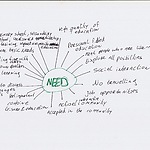In order to define the future subsystem, let us first analyse the societal needs.
The societal needs
An increased and/or maintained connection with the identity of being a ‘Texelaar’ is expected to be needed in the future. While this is so, there will probably be a need to raise the level of education and jobs in the island. This can form a paradox: enhancing and maintaining a connection with the identity of Texel, but still increase the level of education and jobs that will for a large part need education and working outside of the island. This is expected based on the assumption that globalisation, digitalisation and income equality will increase, leading to higher standards of living and working. The following societal needs are expected, combined with some expected technologies:
- Increased and/or maintained connection with the Texel identity (I am a Texelaar!)
- Establishing the opportunity that everyone can get a broader view of the world without having to leave Texel
- Establishing the opportunity that everyone can get high quality of education without having to leave Texel
- More HAVO and VWO education on Texel
- Higher quality of primary school leading to more HAVO and VWO students
- Better opportunities to follow HBO and university studies while living at Texel
- Better opportunities to follow internships for these studies at Texel
- Better opportunities to work on, from and/or at Texel (related to the trend distance working)
- Local active learning (e.g. do an assignment for a local project in collaboration with practice)
In essence it comes down to increasing and maintaining the identity of Texelaars by having people living at the island while providing opportunities to have higher levels of education and work. All needs are gathered in this word web below.
The future socio-technological system
As mentioned in 1.2, there is a lack of personally fitted education. By decreasing the quality of education on the island or even closing the schools, children, students and parents are forced to leave the island for the mainland, where they can explore a wide range of possibilities and fitted education matched on the questions and interest of the person. In the future, it would be preferable if more inhabitants stay on the island for living, working and leisure and all these within a strong communal feeling. In this future socio technical sub system, distance learning will be the tool for achieving this goal. There is an increase of the use of computers, smartphones, smart watches, smart glasses etc. The possibilities are countless and one can make contact with the whole world, get information and learn. Sharing information, ideas and new concepts becomes very easy.
In 2065, the educational procedure has not changed dramatically compared to the current system. Physical presence in the classroom is still required; classrooms however are fully equipped with new technological tools (smart boards, laptops, simulation devices etc.) which contribute help students get knowledge in a more creative and comprehensive way. The time students spend in school has not changed much as well. Part of the educational procedure is focused on sustainability issues in general and more specifically, hands-on activities related to sustainable local projects. The teaching method helps the students to discover their field of interest by getting them in touch with different professional areas, emphasizing on professions which can both contribute to sustainability of the island and be sufficient to earn a living. Even if students find their interest in activities on the island, such as in the local projects or as farmers, they will be strongly encouraged to follow higher studies in order to get advanced knowledge and be keep up with developments in the relevant field.
Students however are not discouraged to leave the island for studies. We believe that experiencing life in a different place will broaden their horizons and contribute to their overall development, and as long as there are working opportunities on the island after they finish their studies, young people can again inhabit Texel. On the other hand, students who do not want to leave the island have the opportunity to stay and follow distance university studies. Virtual presence is prevailing in this case; online meetings/courses/evaluation as well as practicing on the sustainable projects on the island become part of their everyday life.
However, further support in the online learning processes is needed. There are people who need direct social contact, to have direct feedback, discuss subjects which are interesting, which means meetings that require physical presence are also necessary. On meeting moments, all students, teachers and professionals will gather on specific locations where all questions and deeper knowledge can be obtained directly. The municipality is responsible to arrange or provide the spaces for those meetings. This does not necessarily means building new spaces, but the main goal is to take advantage of the empty and unused spaces all around the island. For instance, there are many houses/hostels etc meant for tourists in summer, which during winter remain empty. In cooperation with the group of “accommodate community”, we could propose that we take advantage of these spaces for educational purposes during the less busy periods such as wintertime, and leave them available for tourists’ accommodation during summer, when schools are anyway closed. In this way, re-use of buildings as a sustainable strategy is introduced in the island.
In short, in 2065 the population of the island is being revived. Both parents and students are connected with local projects, doing some work or having other kind of interest in it. Distance learning is fully incorporated through various technologies and methods, which will be discussed later on. The children will be able to go to VMBO, HAVO or VWO schools at the island and these schools use many local projects for their local active learning methods. Some will want to go to secondary schools on the mainland, which will be made possible with special ‘distance secondary learning systems’. When students go to HBO or a university, they will not need to move to the city or place of the educational institution. Being present for 1 or 2 days will be enough, the rest of the studies can be done through various methods which will be discussed later. MBO student will still need to go a lot to the educational institutions, leaving it up to them whether they want to move or not. As more and higher educated people live and work at and/or from Texel, the economic competitiveness of Texel will rise. Also, these people will feel true Texelaars, leading to more and more initiated sustainable projects for the island.
2065 and a strong local identity
People want to learn and explore their interests, have social contact with like-minded. They want to have the feeling they are part of a community and are accepted by those people, that they can add a personal touch and help each other. There is a need for a socially active and inspiring community, which brings out the best of each person.
While children, youngsters, students and adults learn, connect and are helping each other, a close community bond is created. There is also a need for professionally educated adults, which can help the community. Learning and working is mostly done in and around the house. So, during the day there are a lot of opportunities to plan activities, from doing groceries, sporting, going to a smart cafe or library. Meetings are not forced or boring like they feel nowadays. It's free, interactive, motivating and stimulating to get the best out of your own. Texel becomes a future test panel, where old and new technologies can be tested. Where students from whole the Netherlands gather to do rehearse and learn about the environment, sustainability and the development of new products. People have time to spend with each other during day and study in the evening. They are connected and linked with each other.
While more people are spending time on the island, interact on the island and purchase or consume on the island, wider job opportunities are possible, by creating new types of institutes which need space and locations. While people interact more they create a larger communal feeling, leading to activities and sporting together. People are physically and mentally more healthy and motivated to do things for and with the community and explore their potentials and own limitations and go beyond their own borders. By doing so, the identity of the inhabitants and Texel will be increased, also the amount of the population will become stable or will show a slightly grow. As the level of knowledge increase, the amount of higher educated people that live on the island will increase. The island will function as a new breeding ground of talented people. On the road to 2065 there is a lot to be done.


